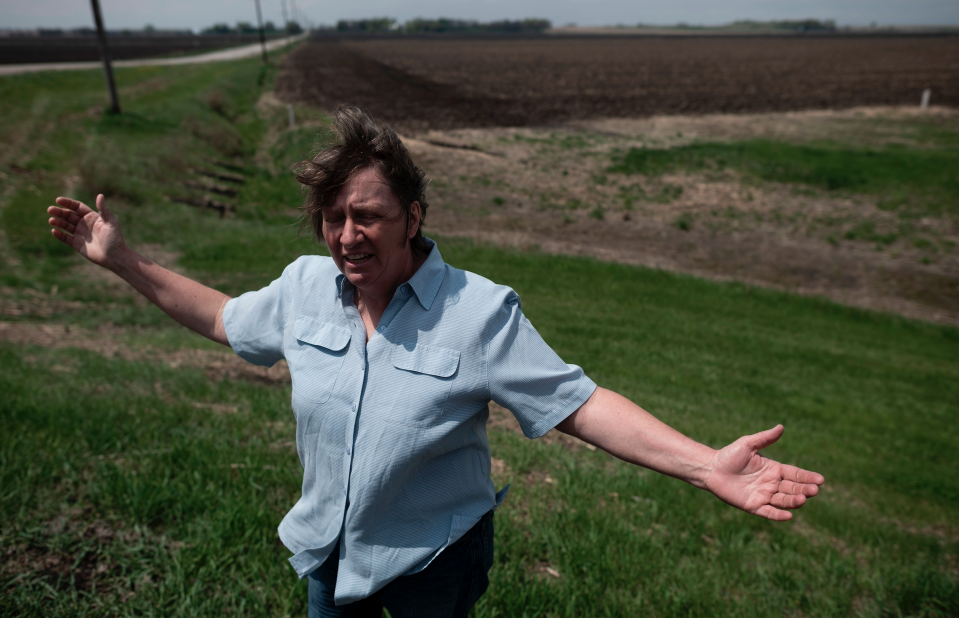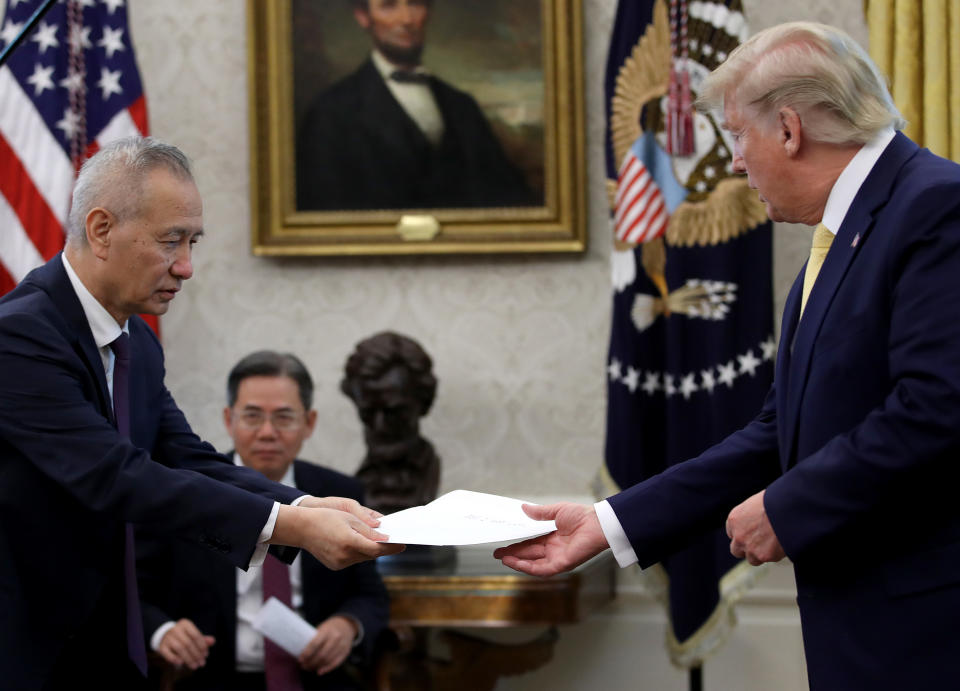Farmer who left GOP says 'farm wives' should worry Trump
The U.S. and China are prepared to sign phase one of a trade deal, and President Trump tweeted that China “agreed to many structural changes and massive purchases of Agricultural Product, Energy, and Manufactured Goods.”
But the deal — even if China follows through with the agricultural purchases — may not undo the damage that has been done to American agriculture since the tit-for-tat tariffs began in March 2018.
And Ohio soybean farmer Chris Gibbs, who left the GOP after becoming particularly frustrated with Trump’s trade and agricultural policies and is now considering a run for office, thinks that Trump should worry about the spouses of farmers heading into the 2020 presidential election.
“I’ve talked to farm wives,” Gibbs said on Yahoo Finance’s On the Move. “And what they’re looking for their farms, when they look out over the horizon, they want some predictability. And they don’t want to see storm clouds for their farms, for their families, and moving those farms on down through the generations. And the administration’s failed on both of those for family farms.”

It’s important to note that not all spouses of farmers are wives: Women make up 36% of the roughly 3.4 million farmers in the U.S., a number that has increased by 27% over the last five years, according to the latest Census of Agriculture. Furthermore, 56% of the roughly 2 million farms in the U.S. employ at least one female producer and 38% of U.S. farms are run by a woman.
Nevertheless, Gibbs predicted that “farm wives are a place where the president has some real vulnerability because those farm wives, when they go into the ballot box, they’re going to use this pen like a samurai sword.”
‘This war on trade affects real people’
Part of the issue stems from the fact that negotiations between the U.S. and China have continuously fallen through. Tensions grew especially thick through the summer of 2019 after the U.S. declared China a currency manipulator. Things escalated when China responded by announcing tariffs on $75 billion worth of goods, including yet again, agricultural products.
“There’s certainly a lot of tension,” Gibbs said. “This war on trade affects real people. It affects real farmers and communities with bankruptcies, increases nationwide in suicides.”
According to the American Farm Bureau, farm debt is projected to reach a record high in 2019 of $416 billion. While this isn’t solely due to the trade war, the tensions don’t help farmers’ situations at all.
Until stability returns for U.S. agriculture, Gibbs sees “real fissures” in the support for Trump.
“Those always crack before the whole thing crumbles,” he said. “Farmers, historically, over the past two years, have been supportive of the president. I feel like I’m on an island a lot of times, that I’m the only one that’s been outspoken.”

If Gibbs were to run and be elected to Congress, he said that one of his main priorities would be rebuilding fractured trade relationships.
“I would think that we need to gather our allies, that by the way, we’ve tariffed to death,” he said. “It’s like this. The beatings will continue until morale improves. That’s where we’re at. We have to knock that off because to take on China, it’s never going to be just a singular U.S. taking it on alone. It’s going to have to be a set of allies.”
Gibbs noted that the Trans-Pacific Partnership (TPP) — aborted by Trump upon taking office — would have served as a deterrent to China.
“We had that framework in the Trans-Pacific Partnership,” Gibbs said. “We had them surrounded. It wasn’t going to be the end-all, but we had that framework of partnering allies that we could have gone after China then and got those real, real structural reforms that not only agriculture needs, but also business needs as well to move forward.”
‘It’s simply a promise’
The phase one trade deal reportedly includes China committing to increase U.S. agriculture purchases by $32 billion over two years to raise the annual total to $40 billion. Gibbs stressed that should only be taken at face value.
“It’s simply a promise, and we don’t know what we have here,” Gibbs said, adding that people “need to use a benchmark of about $23 billion that we were doing in agricultural trade with China prior to the war on trade that we’re in the middle of.”
He added that the reported increase is “hardly any increase at all” because the deal “doesn’t account for anything that we’ve lost over the last two.”

Furthermore, farmers worry about the loss of trading partners that had been built up over the years.
“This trade thing is what’s brought on by the president and it’s really frustrating because he took away all of our markets,” Bob Kuylen, a farmer from North Dakota who grows spring wheat and sunflowers, previously told Yahoo Finance.
Losing customers has become a major issue. Soybean farmers have been dealing with this, as China has turned to other countries like Brazil for soybeans. Kuylen said this is also happening for wheat farmers, as China has begun importing wheat from Russian regions.
“Supply chains have changed,” Gibbs said. “China’s buying more from Brazil. My goodness, they’re buying some from Russia for heaven’s sake — not a lot, but that’s probably more of a political antagonistic move.”
He added that the supply chains “have shifted and changed for the next generation now. It’s going to be a long time before we get these back.”
Adriana is an associate editor for Yahoo Finance. She can be reached at adriana@yahoofinance.com. Follow her on Twitter @adrianambells.
READ MORE:
Trade war: New analysis updates staggering amount Americans pay for Trump's tariffs
Ohio farmer who left the GOP over Trump's trade policies wants to unseat Representative Jim Jordan
Read the latest financial and business news from Yahoo Finance
Follow Yahoo Finance on Twitter, Facebook, Instagram, Flipboard, SmartNews, LinkedIn, YouTube, and reddit.
